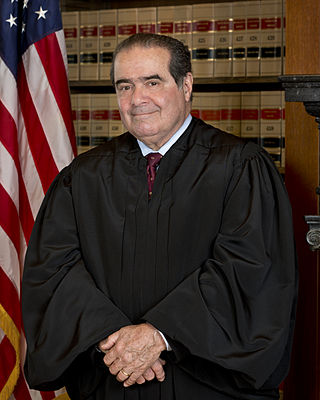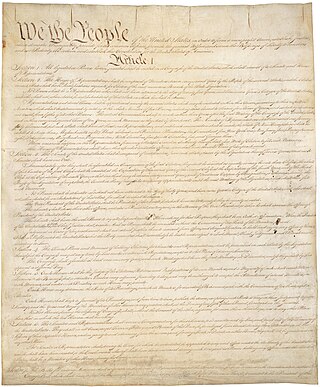
Jurisprudence is the philosophy and theory of law. It is concerned primarily with both what law is and what it ought to be. That includes questions of how persons and social relations are understood in legal terms, and of the values in and of law. Work that is counted as jurisprudence is mostly philosophical, but it includes work that also belongs to other disciplines, such as sociology, history, politics and economics.

Black's Law Dictionary [BLD] is the most frequently used legal dictionary in the United States. Henry Campbell Black (1860–1927) was the author of the first two editions of the dictionary.

Antonin Gregory Scalia was an American jurist who served as an associate justice of the Supreme Court of the United States from 1986 until his death in 2016. He was described as the intellectual anchor for the originalist and textualist position in the U.S. Supreme Court's conservative wing. For catalyzing an originalist and textualist movement in American law, he has been described as one of the most influential jurists of the twentieth century, and one of the most important justices in the history of the Supreme Court. Scalia was posthumously awarded the Presidential Medal of Freedom in 2018, and the Antonin Scalia Law School at George Mason University was named in his honor.
And/or is an English grammatical conjunction used to indicate that one or more of the cases it connects may occur. It is used as an inclusive or, because saying "or" in spoken language might be inclusive or exclusive.
Legal formalism is both a descriptive theory and a normative theory of how judges should decide cases. In its descriptive sense, formalists maintain that judges reach their decisions by applying uncontroversial principles to the facts; formalists believe that there is an underlying logic to the many legal principles that may be applied in different cases. These principles, they claim, are straightforward and can be readily discovered by anyone with some legal expertise. Supreme Court Justice Oliver Wendell Holmes Jr., by contrast, believed that "The life of the law has not been logic: it has been experience". The formalist era is generally viewed as having existed from the 1870s to the 1920s, but some scholars deny that legal formalism ever existed in practice.

Originalism is a method of constitutional and statutory interpretation. Most Originalists assert that legal text should be interpreted based on the original understanding at the time of adoption, while some also incorporate original intent. Originalists object to the idea of Judicial activism and other significant legal evolution being driven by judges misusing the common law framework. Instead, Originalists argue for democratic modifications of laws through the Legislature or through Constitutional amendment.
In the United States, strict constructionism is a particular legal philosophy of judicial interpretation that limits or restricts the powers of the federal government only to those expressly, i.e., explicitly and clearly, granted to the government by the United States Constitution. While commonly confused with textualism or originalism, they are not the same, and in fact frequently contradict, as textualists like Antonin Scalia have noted.
Statutory interpretation is the process by which courts interpret and apply legislation. Some amount of interpretation is often necessary when a case involves a statute. Sometimes the words of a statute have a plain and a straightforward meaning. But in many cases, there is some ambiguity in the words of the statute that must be resolved by the judge. To find the meanings of statutes, judges use various tools and methods of statutory interpretation, including traditional canons of statutory interpretation, legislative history, and purpose. In common law jurisdictions, the judiciary may apply rules of statutory interpretation both to legislation enacted by the legislature and to delegated legislation such as administrative agency regulations.

A Latin Dictionary is a popular English-language lexicographical work of the Latin language, published by Harper and Brothers of New York in 1879 and printed simultaneously in the United Kingdom by Oxford University Press.

The Latin adverb sic inserted after a quoted word or passage indicates that the quoted matter has been transcribed or translated exactly as found in the source text, complete with any erroneous, archaic, or otherwise nonstandard spelling, punctuation, or grammar. It also applies to any surprising assertion, faulty reasoning, or other matter that might be interpreted as an error of transcription.
Textualism is a formalist theory in which the interpretation of the law is based exclusively on the ordinary meaning of the legal text, where no consideration is given to non-textual sources, such as intention of the law when passed, the problem it was intended to remedy, or significant questions regarding the justice or rectitude of the law.
The Texas Law Review is a student-edited and -produced law review affiliated with the University of Texas School of Law (Austin). The Review publishes seven issues per year, six of which include articles, book reviews, essays, commentaries, and notes. The seventh issue is traditionally its symposium issue, which is dedicated to articles on a particular topic. The Review also publishes the Texas Law Review Manual on Usage & Style and the Texas Rules of Form: The Greenbook, both currently in their fourteenth editions. The Texas Law Review is wholly owned by a parent corporation, the Texas Law Review Association, rather than by the school.

Bryan Andrew Garner is an American legal scholar and lexicographer. He has written more than two dozen books about English usage and style such as Garner's Modern English Usage for a general audience, and others for legal professionals. Garner also wrote two books with Justice Antonin Scalia: Making Your Case: The Art of Persuading Judges (2008) and Reading Law: The Interpretation of Legal Texts (2012). He is the founder and president of LawProse Inc.
Michael Ian Krauss is a professor emeritus of law at Antonin Scalia Law School, specializing in tort law, products liability, jurisprudence and legal ethics. He writes a Torts and Legal Ethics column for Forbes.
"Choate", as used in American law, means "completed or perfected in and of itself", or "perfected, complete, or certain".

The law of the United States comprises many levels of codified and uncodified forms of law, of which the most important is the nation's Constitution, which prescribes the foundation of the federal government of the United States, as well as various civil liberties. The Constitution sets out the boundaries of federal law, which consists of Acts of Congress, treaties ratified by the Senate, regulations promulgated by the executive branch, and case law originating from the federal judiciary. The United States Code is the official compilation and codification of general and permanent federal statutory law.

Judicial interpretation is the way in which the judiciary construes the law, particularly constitutional documents, legislation and frequently used vocabulary. This is an important issue in some common law jurisdictions such as the United States, Australia and Canada, because the supreme courts of those nations can overturn laws made by their legislatures via a process called judicial review.
Scribes—The American Society of Legal Writers—is an organization dedicated to encouraging legal writers and improving legal writing throughout the entire legal community: in court, in the law office, in the publishing house, and in law school. Founded in 1953, Scribes is the oldest organization of its kind. Scribes has almost 2,700 members, including state and federal judges, practicing lawyers, law-school deans and professors, and legal editors.

Bruce Allen Murphy is an American judicial biographer and scholar of constitutional law and politics. He is the Fred Morgan Kirby Professor of Civil Rights at Lafayette College in Easton, Pennsylvania, a position he has held since 1998. Prior to that appointment, he was a professor of Political Science and a professor of American History and Politics at Pennsylvania State University.










